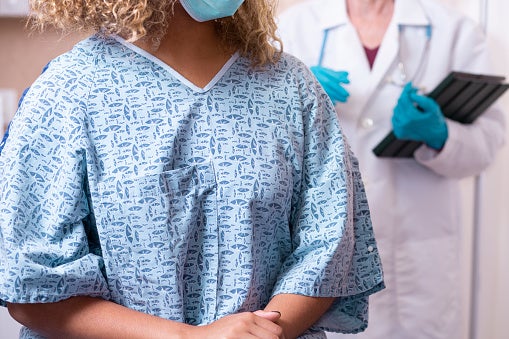You have a better chance of surviving breast cancer if your health care provider finds and treats it early, when it’s small and hasn’t spread. The best way to find breast cancer early is to be screened regularly. Screening means being checked before you have any symptoms. Screening isn't possible for many kinds of cancer, but it is with breast cancer. Screening doesn't guarantee that you won't get cancer or die from it, especially if it's found after it has spread. But regular screening may help find the cancer earlier. This is called early detection.
How is screening for breast cancer done?
Screening for breast cancer in women of average risk can include:
-
Breast self-awareness. In the past, a breast self-exam was recommended. It was a detailed method of examining your breasts once a month. Most experts now advise breast self-awareness instead. This means having a sense of what's normal for your breasts. If you notice even small changes in how they look or feel, contact your health care provider right away.
-
Clinical breast exam (CBE). Experts don't agree if there's a clear benefit of CBEs. Talk with a provider about your risk factors and decide whether to have a CBE.
-
Mammography. A screening mammogram is a kind of X-ray used to help find breast tumors before they can be felt or cause other symptoms. During the test, your breast is pressed between two plastic plates that flatten and spread the tissue. Very low levels of radiation are used to take a picture of the inside of your breast. Many facilities have digital mammography. This displays results on a computer instead of on film. The test can be uncomfortable, but it lasts only a few moments. There are more details about mammograms below.
-
Breast MRI. An MRI uses magnets, radio waves, and a computer to make detailed pictures of the inside of the breast. Before the MRI, a contrast material (also known as contrast agent or media) may be put into your blood through a vein. This helps to better outline the breast tissue and possible tumors. MRI is only used to screen people who are at a high risk for breast cancer based on factors such as family history or genes.
These screening methods can improve your chances of finding cancer early. Women at high risk for breast cancer may be advised to start breast cancer screening at a younger age. They may also be advised to have an MRI along with their routine mammograms. For some women with dense breast tissue, ultrasound may be done along with mammograms. Your provider can tell you more about your risks and what screenings are right for you.
More about mammograms
A mammogram finds tumors and calcium deposits in the breast. Most calcium deposits are not cancer. But a cluster of very tiny specks of calcium (microcalcifications) can be an early sign of breast cancer. If your mammogram shows anything abnormal, you may need more tests.
A mammogram is the best way to find breast cancer early. But it may not always find cancer. And in some cases, it may find an abnormality that turns out not to be cancer. This is called a false positive.
The benefits and limits of a mammogram vary. They’re based on factors such as age and personal risk.
Experts have different advice for who should have mammograms. Starting at age 40, talk with your doctor about your risk and when to start screening. Discuss the pros and cons of screening before deciding when to start and how often to get a mammogram. Screening recommendations may be different for people at high risk for breast cancer. Screening mammograms are generally advised through age 74. Some people may choose to continue screening mammograms after this if they are healthy and expected to live 10 years or more. Talk with your health care provider about your specific situation.
Featured in


